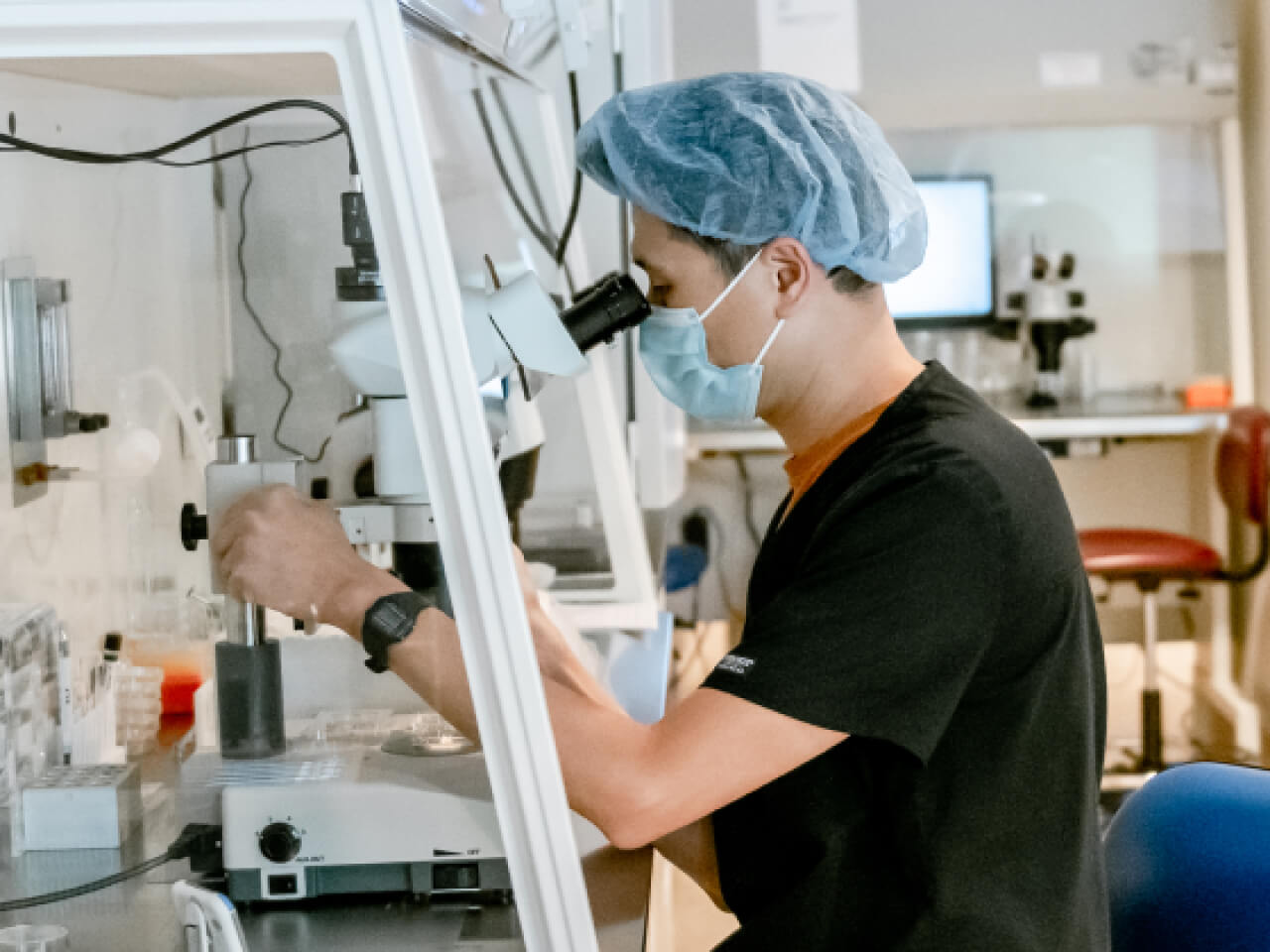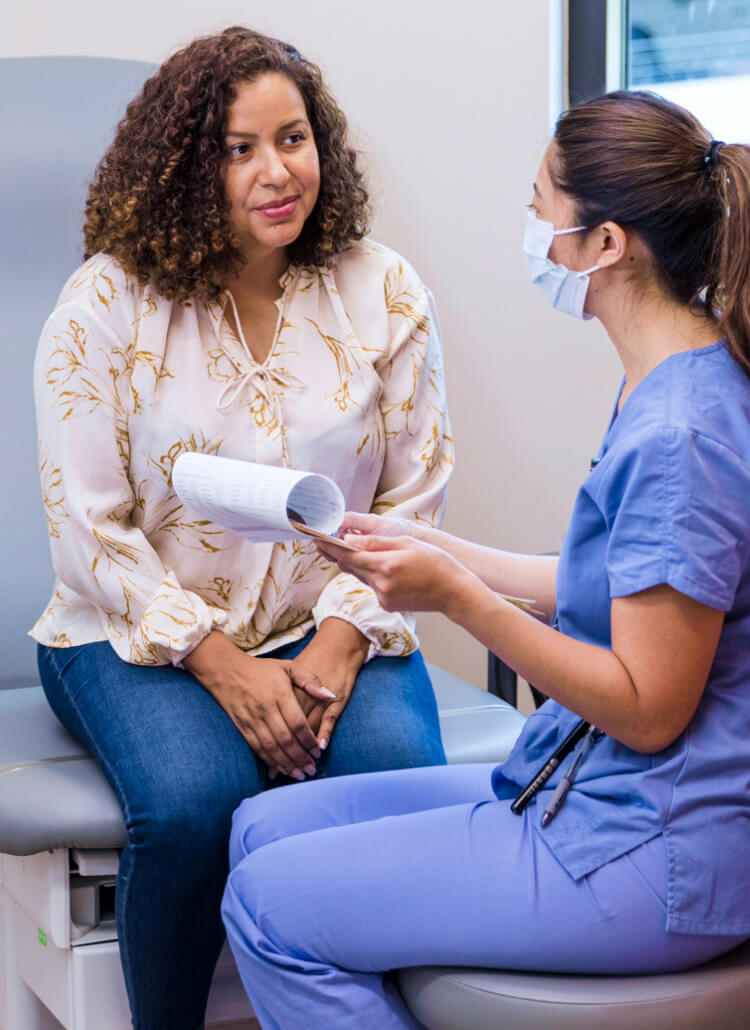How the IUI Process Works

IUI provides high-quality sperm with more opportunities to reach the fallopian tubes at the right moment when a single mature egg is present. This reduces the time and distance sperm must travel, and if successful, increases your pregnancy chances. Prior to IUI, you'll meet with RBA fertility specialists, including doctors, embryologists, and nurses.
Step 1: Ovulation
With IUI, your doctor needs to know exactly when you’re ovulating to ensure that sperm is injected at the right time. You must monitor for signs of impending ovulation, which usually occurs around 10-16 days after the first day of your period. You can time your ovulation with:
- An at-home urine ovulation predictor kit, which detects when your body produces a surge or release of luteinizing hormone. LH spurs ovulation and helps produce hormones for pregnancy.
- Transvaginal ultrasound, an imaging method that lets your doctor visualize your ovaries and egg growth.
- An injection of medications or the hormone, human chorionic gonadotropin (hCG), which makes you ovulate one or more eggs at the right time. Typically, insemination occurs 24-36 hours after LH is detected in your blood or urine, or after the hCG injection.
Step 2: Preparing the semen sample
Your partner provides a fresh sperm sample on the day of the IUI procedure at the clinic. Or, if using frozen donor sperm, the vial is thawed and prepared. This sperm is carefully washed and concentrated, separating the highly active, normal sperm from lower-quality sperm and other elements. Using a healthy, small, highly concentrated sample can increase pregnancy chances. Lower-quality sperm can also affect your body and interfere with fertilization.
Step 3: Insemination
Compared to IVF, IUI is a simpler, more convenient treatment, usually lasting about 15-20 minutes. It is performed in our Atlanta IUI clinic, and you won’t require any medications or pain relievers. You can expect the following stages during this procedure.
- You’ll lie down on the exam table.
- Your RBA doctor or a specially trained nurse will insert a tool called a speculum into your vagina, similar to a Pap test.
- A catheter is inserted through your cervix into your uterus.
- Your healthcare provider injects the washed sperm sample into your uterus.
While generally painless, you may have some mild cramping, discomfort or infection during and afterward. Rarely, there may be spotting, or vaginal bleeding, although this won’t impact your pregnancy chances. You’ll also be taking ovulation-inducing medications, which can increase multiple pregnancy chances. A multiple pregnancy has more risks than a single pregnancy, including early labor and low birth weight.
Step 4: Post-IUI Care
Once insemination is completed, you may need to lie down for 10-30 minutes. Pregnancy occurs when sperm fertilizes an egg and that fertilized egg implants in the uterine lining. You may be given the hormone progesterone, which helps maintain your uterine lining and improves the chances of implantation.
It's recommended not to give yourself an at-home pregnancy test during this time, as it can yield misleading results, such as:
- False-negative – Pregnancy hormones not yet at measurable levels may show negative results when you really are pregnant.
- False-positive – If you're using ovulation-inducing medications, such as HCG, it may remain in your body, and can indicate a pregnancy when you really aren't pregnant.
Your doctor may then have you return about two weeks for a blood test, which is more sensitive in detecting pregnancy hormones after fertilization. Should you not become pregnant, you might try IUI again before moving on to IVF or another treatment.
What are the success rates of IUI?
Success with IUI depends on several factors, including your age, the underlying cause of infertility, sperm quality, and whether fertility medications are used. On average, patients under 35 can expect a 10–20% chance of conception per IUI cycle. These rates decline with age, closely mirroring the natural monthly chances of pregnancy for couples without fertility issues.
At Reproductive Biology Associates, we understand that no two patients are alike. That’s why we personalize each treatment plan to support your individual goals and optimize your chances of success. Whether IUI is your first step in fertility care or part of a broader treatment strategy, our experienced team will guide you through every stage of the process.
We’re here to help you make informed decisions and move forward with confidence.
Understanding IUI vs. IVF: Success Rates, Costs, and More
Deciding between IUI and IVF can feel overwhelming, especially when you’re weighing success rates, costs, and emotional considerations. Both treatments offer unique benefits, and the right choice often depends on your diagnosis, goals, and insurance coverage.
Explore a clear breakdown of both treatments in The Prelude Network®’s IUI vs. IVF overview and see which is right for you.




